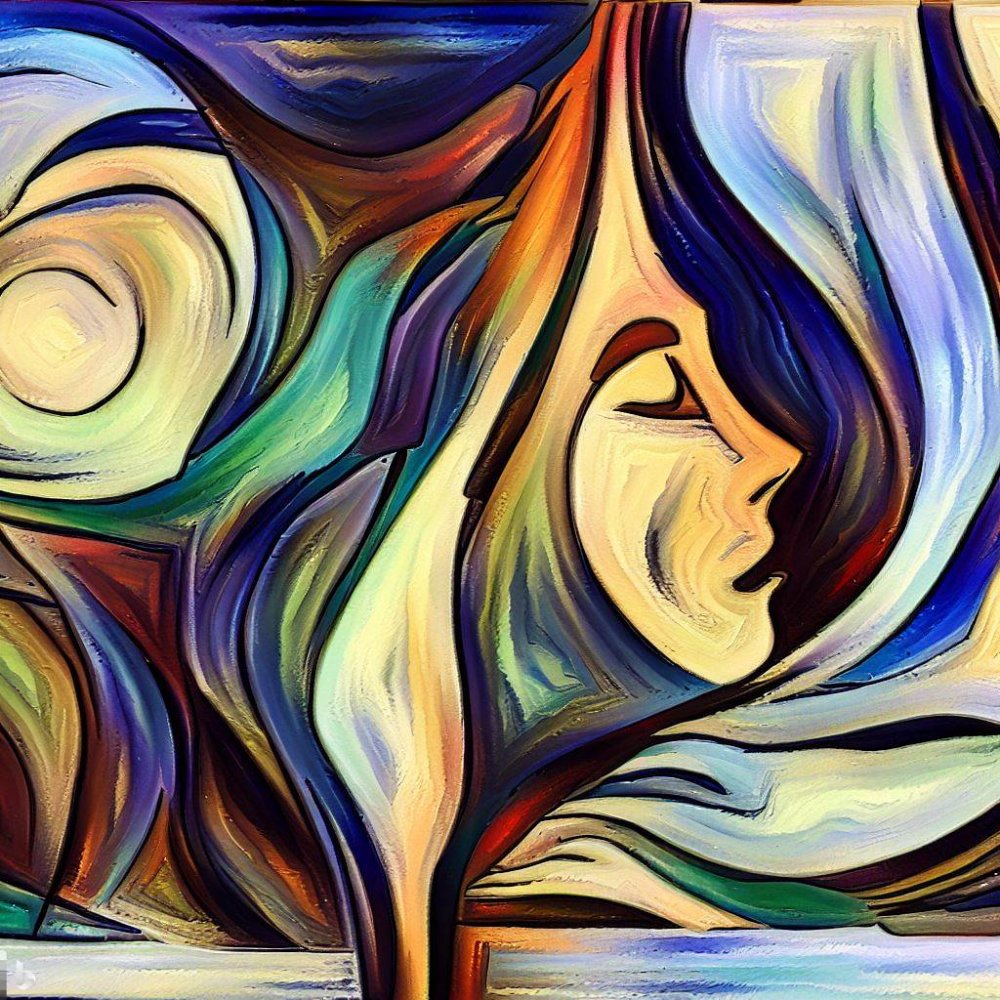"We must realize that if we could have done it better, we would have. In any given situation
each of us does the best we can with what we know at the time." ~ Alan Cohen
 "We have seen how Buddhism anticipated the reluctant conclusions of modern psychology: guilt and anxiety are not adventitious but intrinsic to the ego." ~ David L. Roy
"We have seen how Buddhism anticipated the reluctant conclusions of modern psychology: guilt and anxiety are not adventitious but intrinsic to the ego." ~ David L. Roy
“Keep your eye on the road, and use your rear-view mirror only to avoid trouble.”
~ Michael Meacham
Guilt is a ubiquitous part of the human emotional experience. We feel guilt when we believe we have done something wrong, failed in our duties, or violated our moral code. However, while some degree of guilt can be healthy and appropriate, guilt often becomes an irrationally overblown emotion plaguing our lives.
The problem with guilt is that it relies heavily on cognitive distortions - exaggerated, irrational thought patterns that skew reality. Under the influence of cognitive distortions, we inaccurately inflate our responsibility for perceived wrongs and failures. This creates an irrational sense of guilt far out of proportion to what we may have actually done or not done.
Common cognitive distortions contributing to irrational guilt include:
- Personalization - overlooks the influence of external circumstances, the actions of others, and the complexities of life. It is rarely the case that a single person is solely responsible for a negative event or outcome. Setting unrealistically high standards and expecting perfection can lead to a constant sense of guilt and self-blame.
- Emotional reasoning - "mistakes feelings for reality. If you feel guilty, it must be your fault. If you feel hopeless, there must be no way out. If you feel anxious, something bad is about to happen."
- Catastrophizing - envisioning the worst case scenario and assuming the dire outcome is already a fact. Exaggerating consequences.
- Overgeneralization - applying sweeping meaning to single events.
- Should statements - holding ourselves to rigid, perfectionist standards of what we “should” do, feel, or be. Self-loathing when violating these rules.
- Mind-reading - imagining we know how others negatively judge us without reasonable evidence. Presuming their exaggerated condemnation reflects reality.
- Labeling - branding ourselves as fundamentally flawed or bad based on specific behaviors. Letting actions define our entire identity.
When dominated by these distorted thought patterns, we lose perspective. We ignore mitigating context, external factors, and our own positive qualities and intentions. We strip away rational nuance and falsely believe the worst about what we've done or who we are. This fuels overwhelming, self-loathing guilt far beyond reasonable remorse.
Guilt has value in promoting moral behavior and maintaining social bonds. But unrestrained by rational thought, guilt easily becomes crippling. By developing greater self-awareness and reality-testing distorted thinking, we can respond with appropriate regret rather than irrational self-condemnation. Our mental health and relationships benefit when guilt is kept constructively in check.
While the specific neural mechanisms underlying irrational guilt are not yet fully understood, there are several potential explanations based on current research:
1. Cognitive Distortions: As discussed above, irrational guilt can be influenced by cognitive distortions, such as overgeneralization, personalization, or magnification of one's perceived wrongdoing.
2. Emotional Regulation: Emotions play a significant role in guilt experiences, including irrational guilt. Difficulties in emotional regulation can contribute to the amplification or prolongation of guilt feelings. Brain regions involved in emotional processing, such as the amygdala and insula, may be involved in the dysregulation of guilt-related emotions, leading to irrational guilt.
3. Self-Evaluation and Self-Worth: Individuals with low self-esteem or a tendency to be self-critical may be more prone to experiencing irrational guilt. Negative self-evaluations and a harsh self-judgmental inner voice can contribute to a heightened sense of guilt, even in situations where it may not be warranted. These processes are associated with the activation of brain regions involved in self-referential processing, such as the medial prefrontal cortex.
4. Social and Cultural Factors: Social and cultural factors can shape our beliefs, values, and expectations related to guilt. Cultural norms, upbringing, and social influences can impact an individual's propensity to experience irrational guilt. These factors influence the neural processes underlying guilt through social learning, social comparison, and the internalization of societal standards.
Understanding and addressing irrational guilt often requires psychological interventions, such as cognitive-behavioral therapy (CBT), which can help individuals challenge and reframe irrational thoughts and beliefs associated with guilt.
Related posts:





each of us does the best we can with what we know at the time." ~ Alan Cohen
“Keep your eye on the road, and use your rear-view mirror only to avoid trouble.”
~ Michael Meacham
Guilt is a ubiquitous part of the human emotional experience. We feel guilt when we believe we have done something wrong, failed in our duties, or violated our moral code. However, while some degree of guilt can be healthy and appropriate, guilt often becomes an irrationally overblown emotion plaguing our lives.
The problem with guilt is that it relies heavily on cognitive distortions - exaggerated, irrational thought patterns that skew reality. Under the influence of cognitive distortions, we inaccurately inflate our responsibility for perceived wrongs and failures. This creates an irrational sense of guilt far out of proportion to what we may have actually done or not done.
Common cognitive distortions contributing to irrational guilt include:
- Personalization - overlooks the influence of external circumstances, the actions of others, and the complexities of life. It is rarely the case that a single person is solely responsible for a negative event or outcome. Setting unrealistically high standards and expecting perfection can lead to a constant sense of guilt and self-blame.
- Emotional reasoning - "mistakes feelings for reality. If you feel guilty, it must be your fault. If you feel hopeless, there must be no way out. If you feel anxious, something bad is about to happen."
- Catastrophizing - envisioning the worst case scenario and assuming the dire outcome is already a fact. Exaggerating consequences.
- Overgeneralization - applying sweeping meaning to single events.
- Should statements - holding ourselves to rigid, perfectionist standards of what we “should” do, feel, or be. Self-loathing when violating these rules.
- Mind-reading - imagining we know how others negatively judge us without reasonable evidence. Presuming their exaggerated condemnation reflects reality.
- Labeling - branding ourselves as fundamentally flawed or bad based on specific behaviors. Letting actions define our entire identity.
When dominated by these distorted thought patterns, we lose perspective. We ignore mitigating context, external factors, and our own positive qualities and intentions. We strip away rational nuance and falsely believe the worst about what we've done or who we are. This fuels overwhelming, self-loathing guilt far beyond reasonable remorse.
Guilt has value in promoting moral behavior and maintaining social bonds. But unrestrained by rational thought, guilt easily becomes crippling. By developing greater self-awareness and reality-testing distorted thinking, we can respond with appropriate regret rather than irrational self-condemnation. Our mental health and relationships benefit when guilt is kept constructively in check.
While the specific neural mechanisms underlying irrational guilt are not yet fully understood, there are several potential explanations based on current research:
1. Cognitive Distortions: As discussed above, irrational guilt can be influenced by cognitive distortions, such as overgeneralization, personalization, or magnification of one's perceived wrongdoing.
2. Emotional Regulation: Emotions play a significant role in guilt experiences, including irrational guilt. Difficulties in emotional regulation can contribute to the amplification or prolongation of guilt feelings. Brain regions involved in emotional processing, such as the amygdala and insula, may be involved in the dysregulation of guilt-related emotions, leading to irrational guilt.
3. Self-Evaluation and Self-Worth: Individuals with low self-esteem or a tendency to be self-critical may be more prone to experiencing irrational guilt. Negative self-evaluations and a harsh self-judgmental inner voice can contribute to a heightened sense of guilt, even in situations where it may not be warranted. These processes are associated with the activation of brain regions involved in self-referential processing, such as the medial prefrontal cortex.
4. Social and Cultural Factors: Social and cultural factors can shape our beliefs, values, and expectations related to guilt. Cultural norms, upbringing, and social influences can impact an individual's propensity to experience irrational guilt. These factors influence the neural processes underlying guilt through social learning, social comparison, and the internalization of societal standards.
Understanding and addressing irrational guilt often requires psychological interventions, such as cognitive-behavioral therapy (CBT), which can help individuals challenge and reframe irrational thoughts and beliefs associated with guilt.
Related posts:

How to Motivate Yourself with Kindness Instead of Criticism
How to Motivate Yourself with Kindness Instead of Criticism by Sandy Woznicki, Tiny Buddha Feb 18, 2021 “I don’t always make the best choices, but today I choose compassion over intolerance, sympathy over hatred, and love over fear.” ~ LJ Vanier It’s crazy to me now, to look back and realize...
forum.psychlinks.ca
The Curse of the Self
I just read the August issue of Psychology Today. Its article "Get Over Yourself!" is an excerpt from the new book "The Curse of the Self." The premise of The Curse of the Self: Self-Awareness, Egotism, and the Quality of Human Life is nothing new: Self-awareness is a double-edged sword...
forum.psychlinks.ca
Polyvagal Theory: Understanding the Intersection of Trauma and Guilt
Polyvagal theory, developed by Dr. Stephen Porges, provides a comprehensive framework for understanding the intricate connections between our autonomic nervous system, trauma, and the complex emotions that arise, including guilt. This theory...
forum.psychlinks.ca
Could Fear of Feeling Guilty Underly Some Forms of OCD?
A fear of feeling guilty might be key to some forms of OCD By Christian Jarrett, BPS Research Digest February 3, 2017 There's increasing recognition that our vulnerability to mental health problems isn't just about how much we are prone to certain emotions such as anxiety and low mood, but also...
forum.psychlinks.ca
https://forum.psychlinks.ca/threads/michelle-obama-on-the-guilt-and-anxiety-of-being-a-mother.31718/
